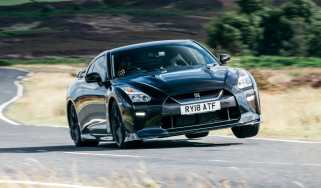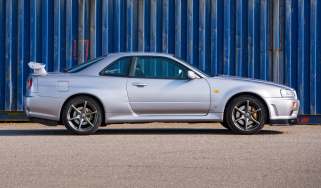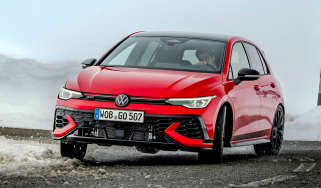The R35 Nissan GT-R is dead after 18 years, and it bows out as a legend
After 18 years, production of the R35 GT-R has ended. Richard Porter pays tribute to this uncompromising, continually evolving tour de force that became an icon in its own lifetime
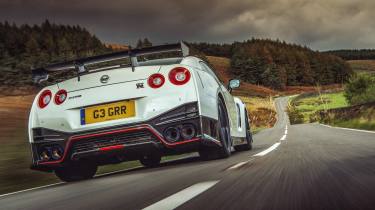
If the past is a foreign country, 2007 feels like a surprisingly long flight away. In the land of 2007, there was just one Taylor Swift album, one Transformers film and, as of January that year, one generation of iPhone. Lewis Hamilton drove for McLaren, Super Aguri drove round near the back, Toro Rosso gave a mid-season seat to a promising young driver called Sebastian Vettel. The Golf GTI was in its fifth generation, the Porsche 997 was still a year from its Gen 2 facelift, an entry-level Ferrari was an F430. And it was into this long-ago landscape that Nissan released a masterpiece, a technical nerdfest and a bona fide evo hero: the R35 GT‑R.
Since this was almost two decades ago, it’s worth reminding ourselves what a remarkable car the R35 was when it was announced. The Nissan of 2007 was bold and confident and it wanted this new, standalone GT‑R to be a supercar-chewing statement of what it could achieve. In Kazutoshi Mizuno it found the relentlessly driven chief engineer it needed for such an ambitious project and he didn’t disappoint. From the detailed aerodynamics perfected by spending two whole years in Lotus’s wind tunnel, to the engine canted slightly forward at rest so under hard acceleration it tipped back to form a perfect straight line from crank to propshaft to transaxle, the attention to detail in the finished car was mind-melting.
Then there was the engine itself, each 3.8-litre twin-turbo V6 hand assembled by one of nine ‘takumi’ craftsmen in a room held at a strict 23 degrees Celsius and slightly above atmospheric pressure to ensure a stable environment and tolerances narrower than an amoeba’s arse. In the main assembly facility the bodyshell was put together on a jig under tension to ensure dimensional precision, and the suspension was assembled on a hydraulic rig that mimicked the weight of the finished car so the geometry and alignment would be perfect every time. It was a car born of an uncompromising zeal to create what Mizuno boldly called ‘a new kind of supercar’.
evo first sampled the GT‑R in April 2007 when Dickie Meaden was invited to drive a late prototype on the Nürburgring GP circuit. He headed to Germany in a 911 Turbo only to find that Nissan had brought one too and was confidently keen for its guests to borrow it. Embargoes being as they are, Meaden had to wait until evo 112 at the end of 2007 to share his track impressions, reporting that the chassis was ‘hugely capable and easily exploitable’.
The following month, in evo 113, the GT‑R was the cover star and Henry Catchpole our man in Japan, testing the car on road and track before calling it ‘an utterly unique, full-on, banzai experience,’ adding ‘yes, it does deserve to be called a supercar’ and awarding it four-and-a-half stars. The following month, in the face of an indignant letter from reader Brian Cassidy, Catchpole explained that the missing half star was over worries the stiff ride might be a pain on UK roads.
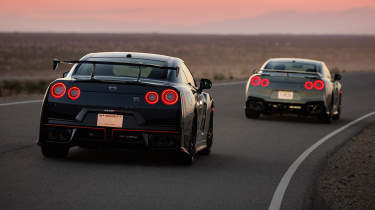
Fast forward to evo 116 and the GT‑R was in Britain, where John Barker, comparing it to an Audi R8, was able to assuage Catchpole’s concerns, saying ‘although the GT‑R is stiffly sprung it’s not jarringly damped’. Barker came away concluding that the new Nissan made the Audi feel ‘a whole generation older’. In the same issue Richard Meaden took the R35 to Bedford Autodrome and lapped it against a contemporary 911 GT3 while praising its ‘miraculous control and blinding pace’. Blinding indeed; with a fastest lap of 1:21.7 it was almost a full second faster than the Porsche and just 0.4 off the next quickest car in the chart, the Ferrari Enzo.
The GT‑R was a shoo-in to be included in evo Car of the Year 2008 (issue 125), where it was up against stiff competition including a Lamborghini Gallardo LP560‑4 and the latest 911 GT2. After three days on the roads up and around Mont Ventoux, team evo had concerns about the Nissan’s weight and size and, in the company of the charming Alfa 8C, wondered if it lacked warmth. But in the final reckoning, its sheer pace and all-round talent, plus the endearingly mechanical way this very digital machine needed time to warm up, saw it take the eCoty gong. It was a truly special piece of work.
Kazutoshi Mizuno, however, wasn’t satisfied. No sooner had the GT‑R gone on sale than his team had tweaked it, upping power from 473 to 478bhp, stiffening the front suspension and fitting firmer bushes at the rear. As befits a car created with an obsessive attention to detail, the GT‑R would be subject to a lot more of this tweaking. Sharper handling here, smoother ride there, a dash more luxury to the interior and mods to the VR38DETT engine so that a regular R35 eventually made 562bhp, 89 more than at launch. The continuous, hyper-detailed evolution of the GT‑R is best encapsulated by the 2012-model-year update in which, for right-hand-drive cars only, the suspension tune was made very slightly asymmetrical to compensate for the tiny side-to-side weight imbalance caused by having only a driver on board.

One of Mizuno’s enduring obsessions was for the GT‑R to beat the 911 Turbo around the Nürburgring, which it did in September 2007, posting a 7min 48sec lap – two seconds faster than the Porsche could manage, even when driven by Walter Röhrl. Over time all the fiddling made the car faster, and by 2013 a specially prepared GT‑R Nismo had slashed the R35’s official Ring time to 7min 8sec. Six years into its life, the GT‑R was still capable of amazing things.
But the R35 had much longer to run and only went off sale in Europe in March 2022, nixed by new drive-by noise rules. Stephen Dobie marked the occasion by taking a Nismo edition car to north Wales in evo 298, reporting that it still possessed a ‘loveably headstrong character’. Dobie was driving a GT‑R again in issue 330 at the start of this year, reviewing the 2025-model-year car which, for the first time, had an LSD on its front axle. Yes, more fiddling. ‘How a car can feel so fighting fit and relevant at this age is nearly as bewildering as the moment those launch GT‑Rs sliced apart the performance hierarchy in the late noughties,’ he wrote. It seemed remarkable when the basic machine had lived through six iterations of 911 Turbo.
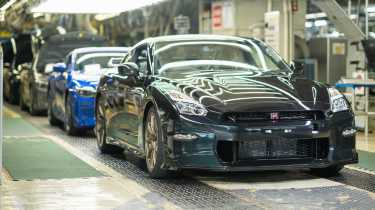
But even a car as revered as this couldn’t last forever, and on Tuesday 26 August 2025 the very last R35 GT‑R came off the Tochigi line, a Premium edition T-spec in Midnight Purple destined for a customer in Japan. It was the last of around 48,000 cars, fewer than the number of 911s Porsche sold in 2024 alone.
Nissan has hinted at an R36 GT‑R with the wild, Batman-ish, all-electric Hyper Force concept of 2023, but it’s not the boisterous, bullish company it was in 2007, nor does it have the funds to pay for a lengthy and uncompromising R&D programme of the kind that created the R35. Even if it did, it would be unlikely to give us a car as unique, talented and enduring as the outgoing GT‑R. We won’t see anything like it again.

